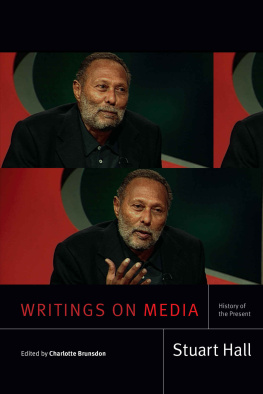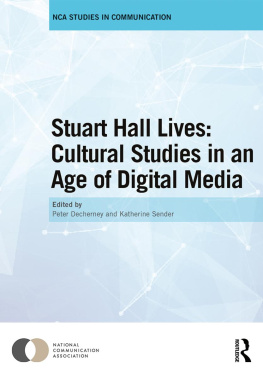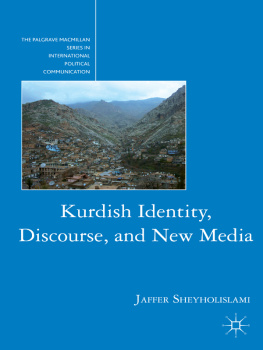Stuart Hall: Selected Writings
A series edited by Catherine Hall and Bill Schwarz
WRITINGS ON MEDIA
History of the Present
Stuart Hall
Edited byCharlotte Brunsdon
DUKE UNIVERSITY PRESS | DURHAM AND LONDON | 2021
All essays Stuart Hall Estate
Introduction and editors commentaries 2021, Duke University Press
All rights reserved
Printed in the United States of America on acid-free paper
Designed by Amy Ruth Buchanan
Typeset in Minion and Meta by Westchester Publishing Services
Library of Congress Cataloging-in-Publication Data
Names: Hall, Stuart, 19322014, author. | Brunsdon, Charlotte, editor. | Hall, Stuart, 19322014. Works. Selections. 2016.
Title: Writings on media : history of the present / Stuart Hall ; edited by Charlotte Brunsdon.
Description: Durham : Duke University Press, 2021. | Series: Stuart hall: selected writings | Includes bibliographical references and index.
Identifiers:LCCN2021011895 (print)
LCCN2021011896 (ebook)
ISBN9781478013778 (hardcover)
ISBN9781478014713 (paperback)
ISBN9781478022015 (ebook)
Subjects:LCSH: Hall, Stuart, 19322014Political and social views. | Mass mediaSocial aspects. | CommunicationSocial aspects. | Racism in mass media. |BISAC: SOCIAL SCIENCE/ Media Studies |IAL SCIENCE/ Black Studies (Global)
Classification:LCC HM1206 .355 2021 (print) |LCC HM1206 (ebook) |302.23dc23
record available athttps://lccn.loc.gov/2021011895
ebook record available athttps://lccn.loc.gov/2021011896
Cover art: Images of Stuart Hall ontelevision in 2000, fromThe Stuart Hall Project(John Akomfrah, 2013), courtesy of John Akomfrah and Smoking Dogs Films. Smoking Dogs Films.
CONTENTS
The research for this selection was based on the bibliography of Halls writings prepared by Nick Beech, and I am grateful to Stuart Halls literary executors for inviting me to undertake the book. I have had considerable support from the University of Warwick and thank the head of the Department of Film and Television Studies, Rachel Moseley; the subject librarian, Richard Perkins; and the departmental administrator, Tracey McVey, as well as the University Humanities Research Fund. James Taylor (along with Amelia Horgan) digitized many of the original articles. He also offered tech support of various kinds, as have Jon Burrows, Michael Pigott, and Richard Wallace. Paul Cuff has worked with me in two phases, first in locating bibliographic items and then, indispensably, in preparing the final manuscript.
This is in many ways a Birmingham book, and I am grateful to Vanley Burke for his photograph of Stuart Hall, and to Richard Dyer, Paul Gilroy, and Angela McRobbie for Birmingham-style collegiality. Derek Bishton has been very helpful in the matter of images, and I must also acknowledge Cathal Abberton of Getty Images. Finally, I am indebted to John Akomfrah, David Lawson, and Ashitey Akomfrah of Smoking Dogs Films for the cover images taken from The Stuart Hall Project, another archival version of Stuart Hall.
INTRODUCTION
Charlotte Brunsdon
Stuart Hall engaged with the media throughout his life. He read newspapers, he watched films and television, he listened to the radio. He loved doing this, even if he didnt always like what he saw or heard. His 1970 essay A World at One with Itself ( While his parts in panel discussions are not retrievable, short reviews and written versions of some radio talks are, and Hall himself has reflected on some of his television work. Halls understanding of his responsibilities as a citizen and an intellectual led him to engage in public discussion and policy advocacy, and this meant broadcasting, speaking at meetings, writing to newspapers, giving evidence to commissions, and contributing to a wide range of ephemeral publications.
This collection sets out to demonstrate the range of this varied work, anthologizing a selection of Stuart Halls writings on twentieth-century media: photographs, the press, radio, cinema, and television.
However, that is not the only history found here. Embedded within the history of the contested shifts from the photography of social democracy to the rise of authoritarian populism and the crisis of the British state, there is the history of postimperial immigration and settlement, in which Hall participates and through which he theorizes questions of race, racism, and, later, identity. Alongside this history of the present, there are at least two other histories. There is the development of Halls own work, the concerns, methods, and concepts that develop, are jettisoned, are explored with others, and are recombined in new ways. And there is also the development of cultural and media studies, the academic field with which Hall is most associated. This history can be tracked partly through the objects of analysis (gossip columns, High Street studio photographs, television), but also through the extent to which the very undertaking of the analysis of these objects must be justified or explained.
Readers who know Stuart Hall primarily as a diasporic intellectual and theorist of black identity may be surprised by how very British these writingswhich date mainly from the 1970sare in their topics and concerns. Presenting this material outside Britain while preparing this book, I have been greeted with astonishment that the theorist of what had clearly featured on syllabuses as conjuncture, articulation, representation, and identity should be so embedded in the detail of postwar British history and British media in the second half of the twentieth century. The concepts with which Hall is most associated seem in some later accounts of his work to have floated free from the contexts within which they were developed. This book provides something of a prehistory of this unmooring, showing Hall concentrating on changing media forms and genres and attending to the complex articulation of news media with the world they framed as meaningful. The subtlety of his theorization of black and diasporic identities emerges from his apprehension of the contradictory modes of postimperial subjectivities in Britain. Hall recounts, in the autobiographical Desert Island Discs narrative ( In these media analyses it is possible to see Hall picking away at the representations, assumptions, and disruptions of postimperial Britain, looking for and at trouble in a world that was seemingly at one with itself.
Ideas of context were essential elements in Halls media analyses. The emphasis he gives to context, and how he understands it, varies throughout his writings. One genealogy suggests that in his early work, in the 1950s and 1960s, when Hall is closest to his undergraduate training in the study of English literature and his unfinished PhD on Henry James, text dominates context. There is a wonderful surviving telerecording in which he reads and analyzes William Blakes poem Tyger, Tyger. The attention to the detail of the verse is very precise, and it is these sounds and rhythms, rather than any context, which occupy him.), Hall is particularly attentive to the contexts of reading and explores how the contemporary viewer might read familiar and unfamiliar images of Caribbean settlement, in the process returning to some of his own readings of
Next page




